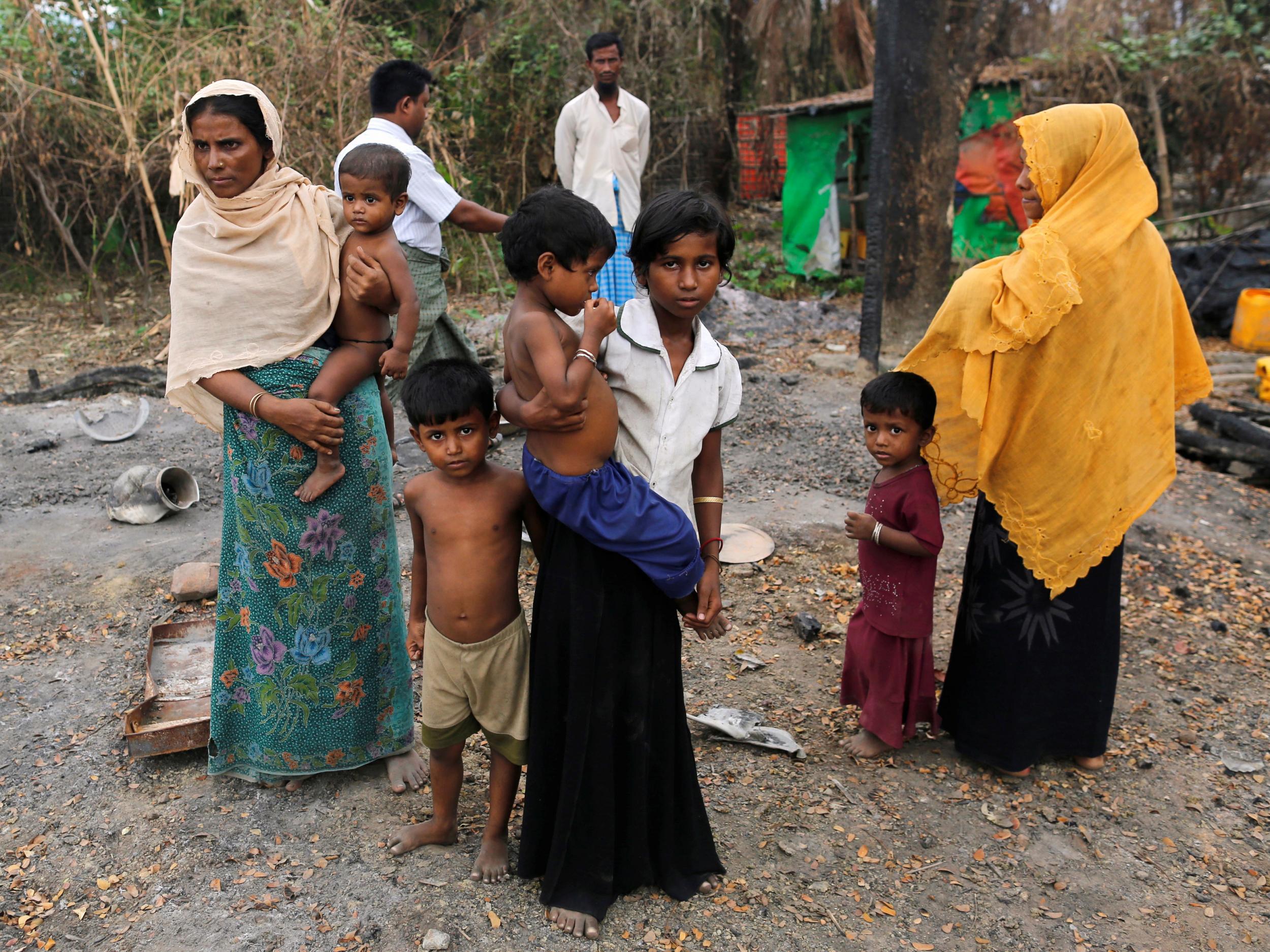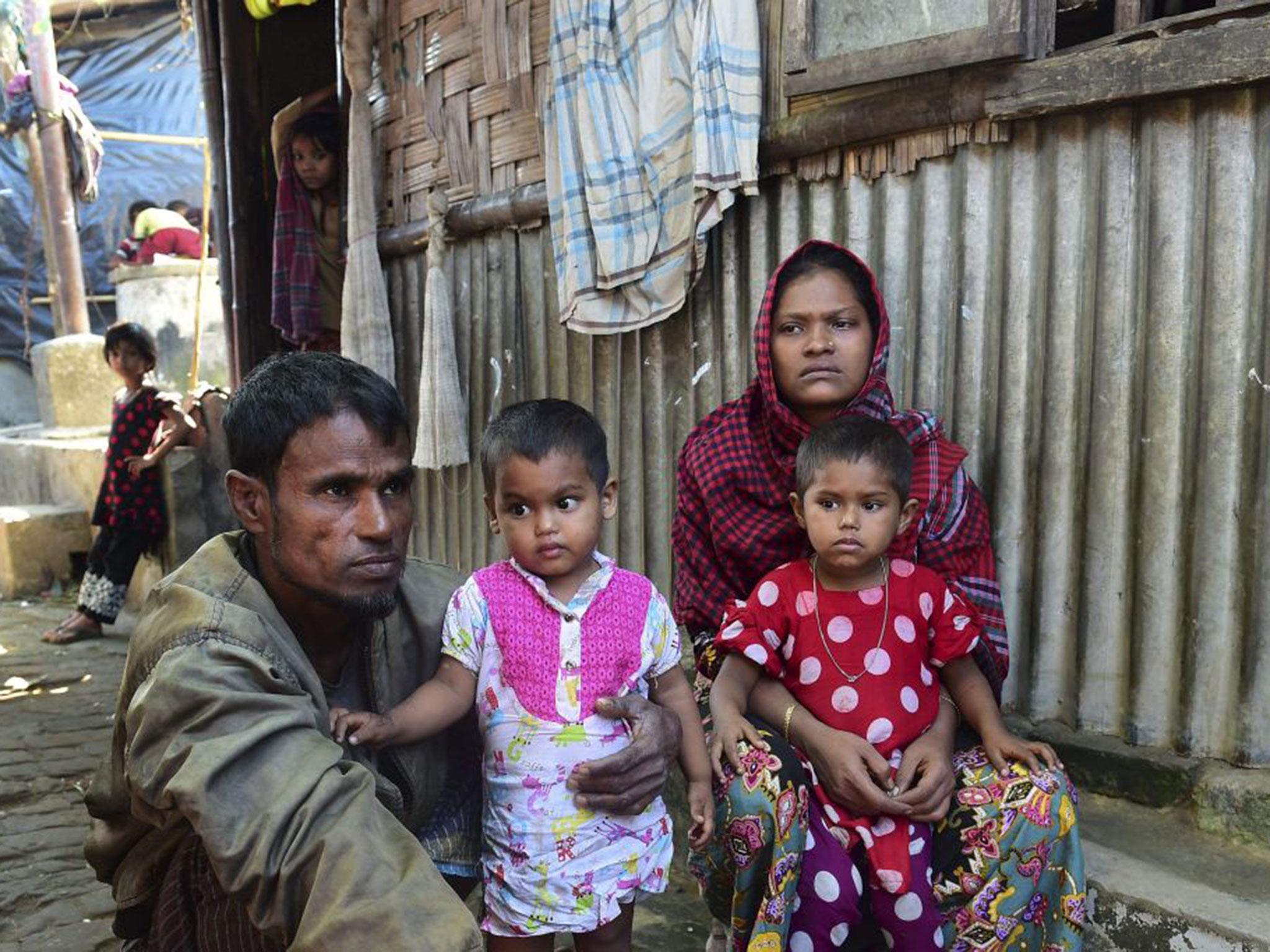Burma: Rohingya girls as young as 13 raped and sexually assaulted by security forces, warns Human Rights Watch
Burmese security forces took part in rape, gang rape, invasive body searches and sexual assaults on Rohingya women and girls in at least nine villages in the northern Rakhine State, report states

Your support helps us to tell the story
From reproductive rights to climate change to Big Tech, The Independent is on the ground when the story is developing. Whether it's investigating the financials of Elon Musk's pro-Trump PAC or producing our latest documentary, 'The A Word', which shines a light on the American women fighting for reproductive rights, we know how important it is to parse out the facts from the messaging.
At such a critical moment in US history, we need reporters on the ground. Your donation allows us to keep sending journalists to speak to both sides of the story.
The Independent is trusted by Americans across the entire political spectrum. And unlike many other quality news outlets, we choose not to lock Americans out of our reporting and analysis with paywalls. We believe quality journalism should be available to everyone, paid for by those who can afford it.
Your support makes all the difference.Women and girls as young as 13 have been raped and sexually assaulted by soldiers and police officers in Burma, according to an alarming report.
In the latest development on alleged attacks on the Rohingya minority in the country, Human Rights Watch has warned that members of the army and border guard police took part in rape, gang rape, invasive body searches and sexual assaults against women and girls in at least nine villages in the Rohingya-dominated Maungdaw district in the final months of last year.
The attacks, described by Human Rights Watch as “sickening”, were reportedly often carried out in groups, with women being held down or threatened at gunpoint by some men while others raped them. Many survivors reported being insulted and threatened on an ethnic or religious basis during the assaults.
It comes three days after a flash report released by the United Nations Office of the High Commission for Human Rights (OHCHR) gave chilling accounts of Rohingya babies and children being slaughtered with knives while their mothers were raped. The report stated that more than half of the 101 women UN investigators interviewed said they were raped or suffered other forms of sexual violence at the hands of Burmese security forces.
The Burmese Government has repeatedly denied allegations of persecution against the Rohingya minority in the country, rejecting any evidence as “propaganda” and arguing that police beatings were ordinary in many countries.
Researchers at Human Rights Watch carried out interviews with 18 women who had fled to Bangladesh from the Rhakine State between December 2016 and January 2017. Of these, 11 had experienced sexual assault, while 17 men and women meanwhile reported having witnessed sexual violence, including against their wives, sisters, or daughters.
One Rohingya woman, said to be in her twenties, told Human Rights Watch how she was "beaten" along with other women, and then raped by soldiers "one by one" as they tore off her clothes.
“[The soldiers] gathered all the women and started beating us with bamboo sticks and kicking us with their boots," the woman said.

“After beating us, the military took [me and] 15 women about my age and separated us. They raped me one by one, tearing my clothes.”
Another woman, in her forties, said 20 soldiers had stormed her home and then killed her husband before raping her at gunpoint.
“They took me in the yard of the home. Another two put a rifle to my head, tore off my clothes, and raped me.… They slaughtered [my husband] in front of me with a machete,” the woman told Human Rights Watch researchers.
“Then three more men raped me [.…] After some time, I had severe bleeding. I had severe pain in my lower abdomen and pain in my whole body.”
Others told of how they had seen security forces raping or sexually assaulting girls as young as 13, or saw girls taken away, heard their screams, and learned soon afterward that they had been raped.
Many women reported that soldiers had threatened or insulted them with language discriminating their status as Rohingya Muslims, calling them “you Bengali bitch” or “you Muslim bitch” while beating or raping them.
“We will kill you because you are Muslim,” one woman said soldiers threatened, while others said security forces asked if they were “harbouring terrorists,” before proceeding to beat and rape them when they said no.
Another woman in her twenties who said soldiers attempted to rape her in her home added that they told her: “You are just raising your kids to kill us, so we will kill your kids.”
The so-called "security operation" in the Rohingya-dominated northern Rakhine State was triggered last October when nine police officers were shot dead on posts along the border with Bangladesh, prompting the security services to launch an intense crackdown on the Rohingya population to track down the insurgents behind the incident.
During the operation in Rakhine, armed members of Burma’s security services are said to have summarily executed men, women and children, looted property and burned down at least 1,500 homes and other buildings. More than 69,000 Rohingya have since fled to Bangladesh, while another 23,000 have become internally displaced in Maungdaw district.
The violence follows a long-standing pattern of violations and abuses, systematic discrimination and policies of exclusion and marginalisation against the Rohingya that has been in place for decades in northern Rakhine.
Following the findings, Human Rights Watch urged the Burmese government to urgently endorse an independent, international investigation into alleged abuses in the region, including into possible systematic rape against Rohingya women and girls.
Burmese authorities have repeatedly denied the claims, saying they had carried out investigations into the allegations and found "insufficient evidence" to take legal action.
In January, a national-level government investigation into the situation in Maungdaw district — where many of the alleged attacks took place — claimed to have “interviewed local villagers and women using various methods," but concluded that it found "insufficient evidence to take legal action up to this date,” contrary to the findings of human rights groups who have interviewed the Rohingya community.
The report added that Rohingya victims of sexual assault face limited access to emergency health care including preventing unwanted pregnancy from rape and infection with HIV, and to treat other sexually transmitted infections.
None of the women Human Rights Watch interviewed had access to medical facilities until they reached Bangladesh, it said, and many reported that even once they has reached Bangladesh, they lacked information about services available or could not arrange child care or pay transportation costs to clinics.
In light of the recent findings, Priyanka Motaparthy, senior emergencies researcher at Human Rights Watch, said: “These horrific attacks on Rohingya women and girls by security forces add a new and brutal chapter to the Burmese military’s long and sickening history of sexual violence against women.
“Military and police commanders should be held responsible for these crimes if they did not do everything in their power to stop them or punish those involved.
“The Government’s failure to investigate rape and other crimes against the Rohingya should make it clear to Burma’s friends and donors that an independent, international inquiry is desperately needed to get to the bottom of these appalling abuses."
Join our commenting forum
Join thought-provoking conversations, follow other Independent readers and see their replies
4Comments